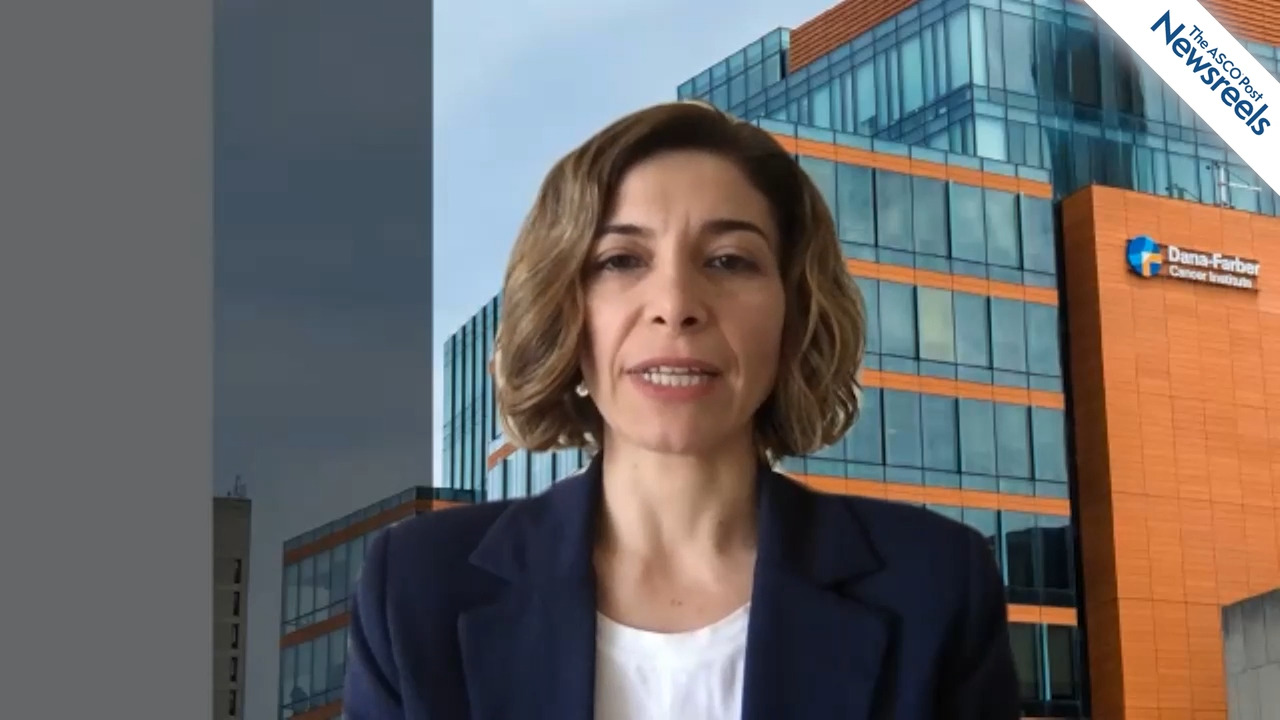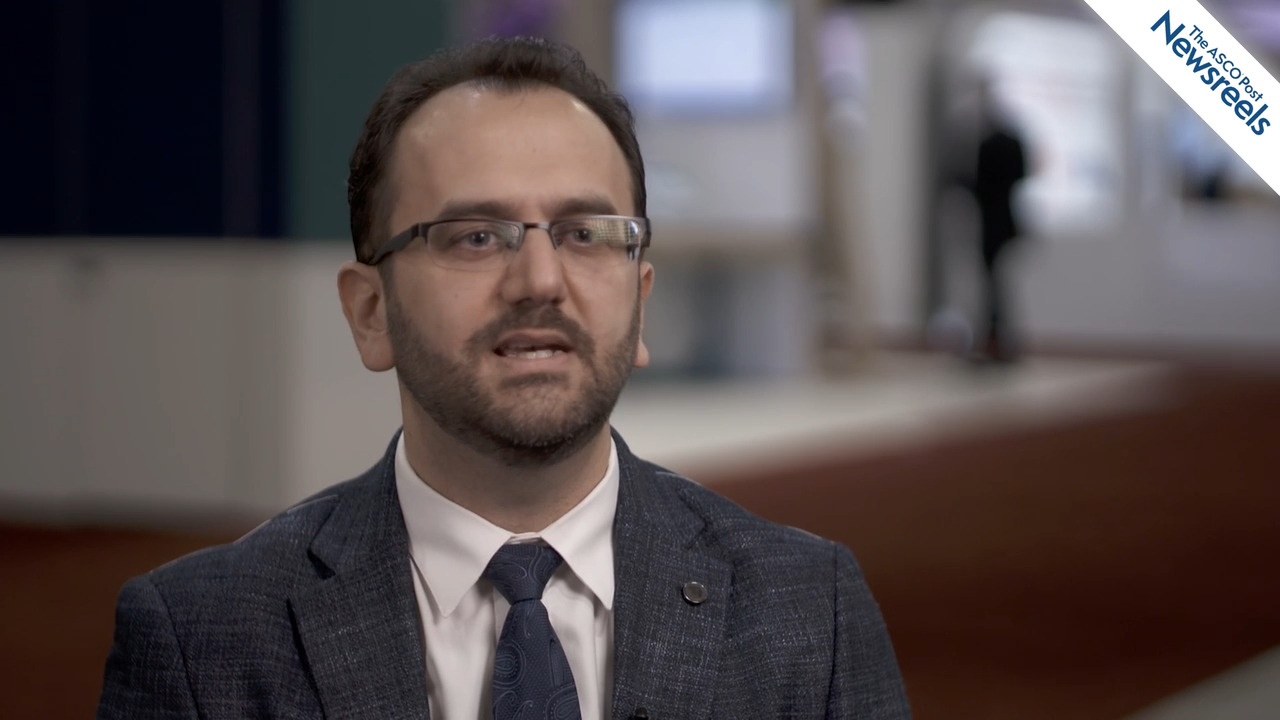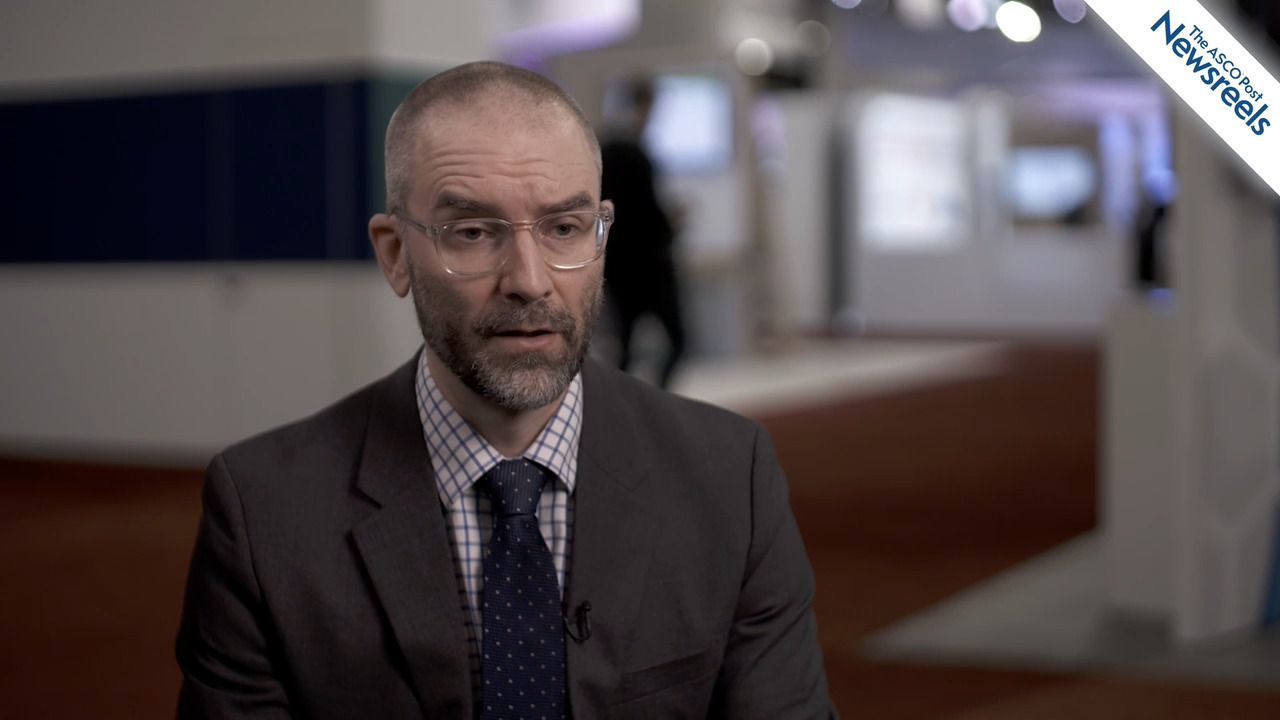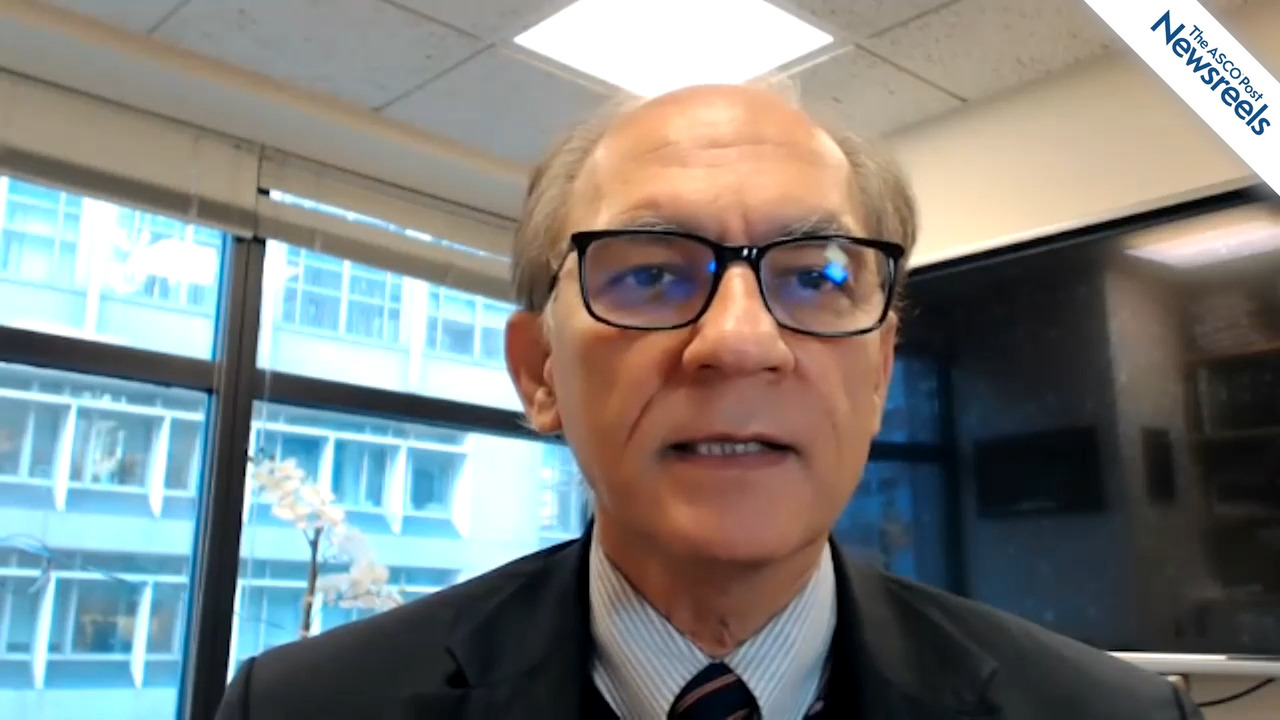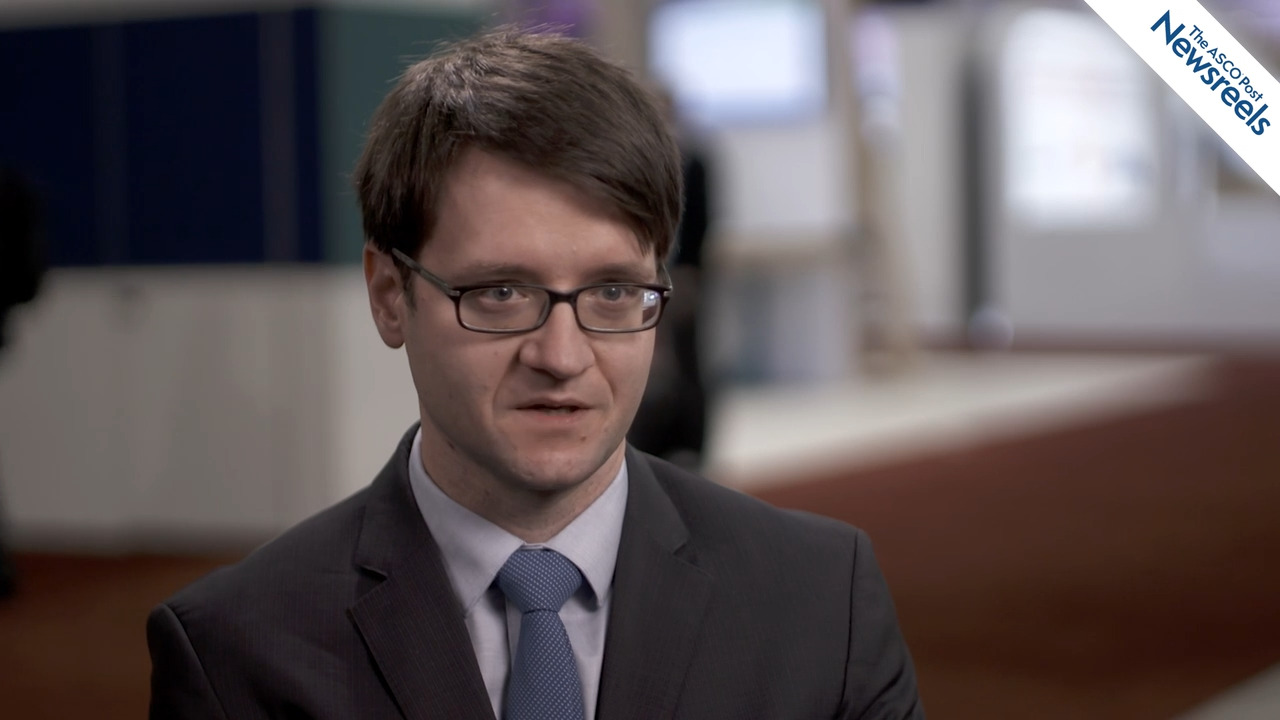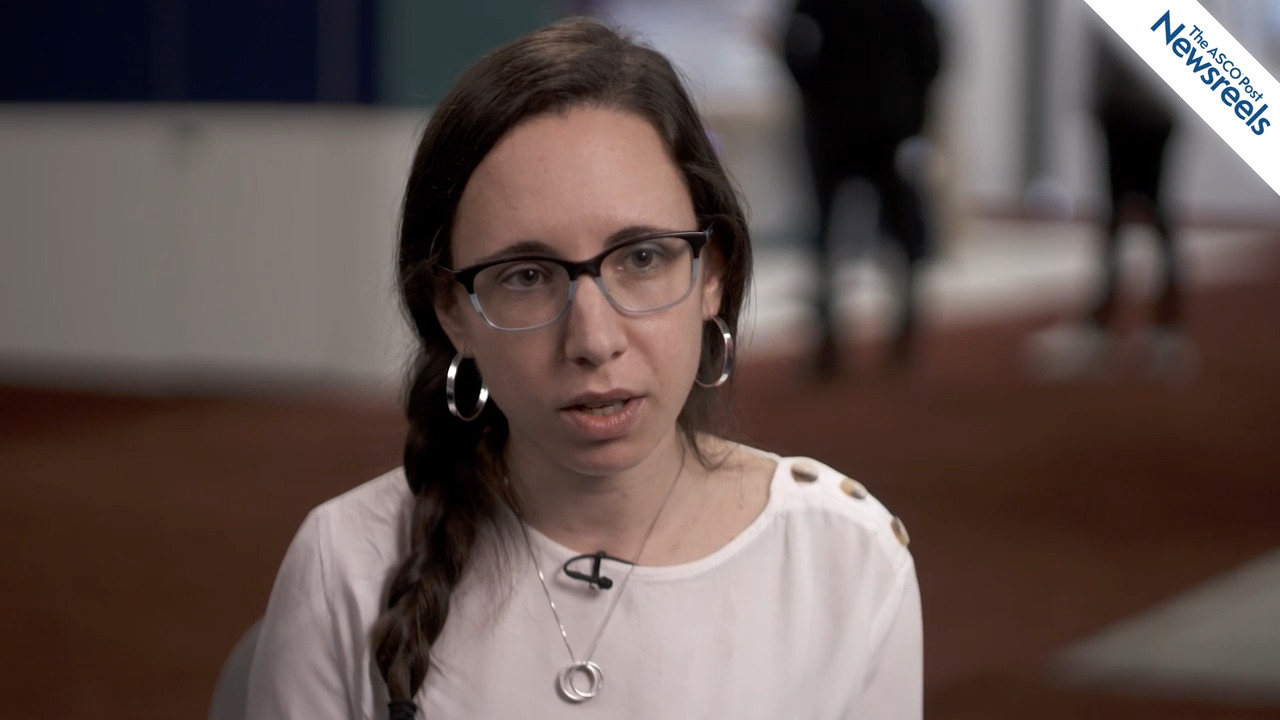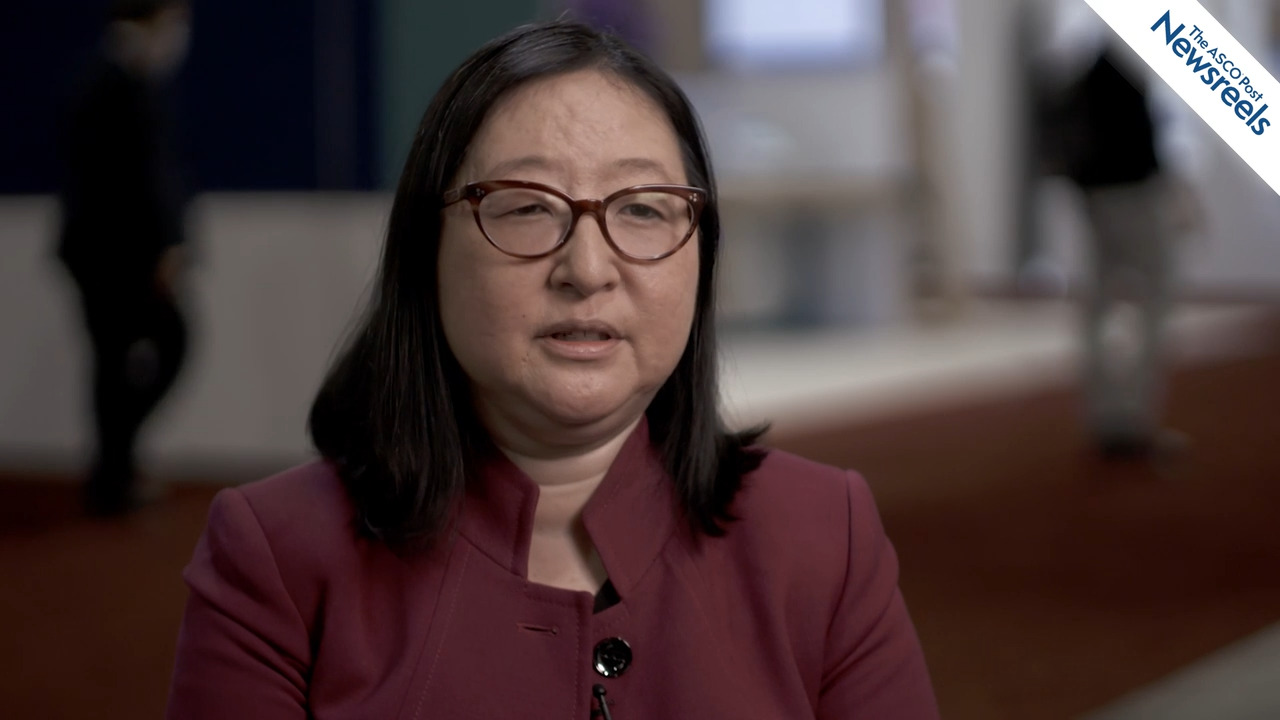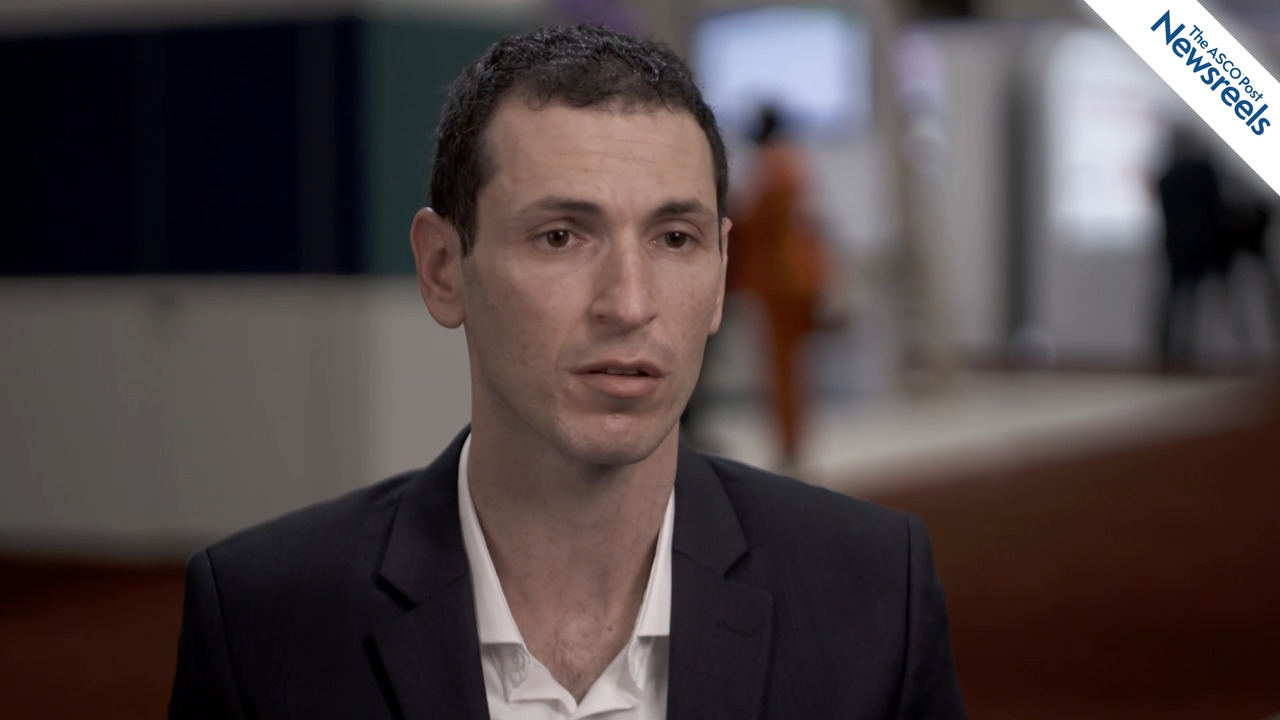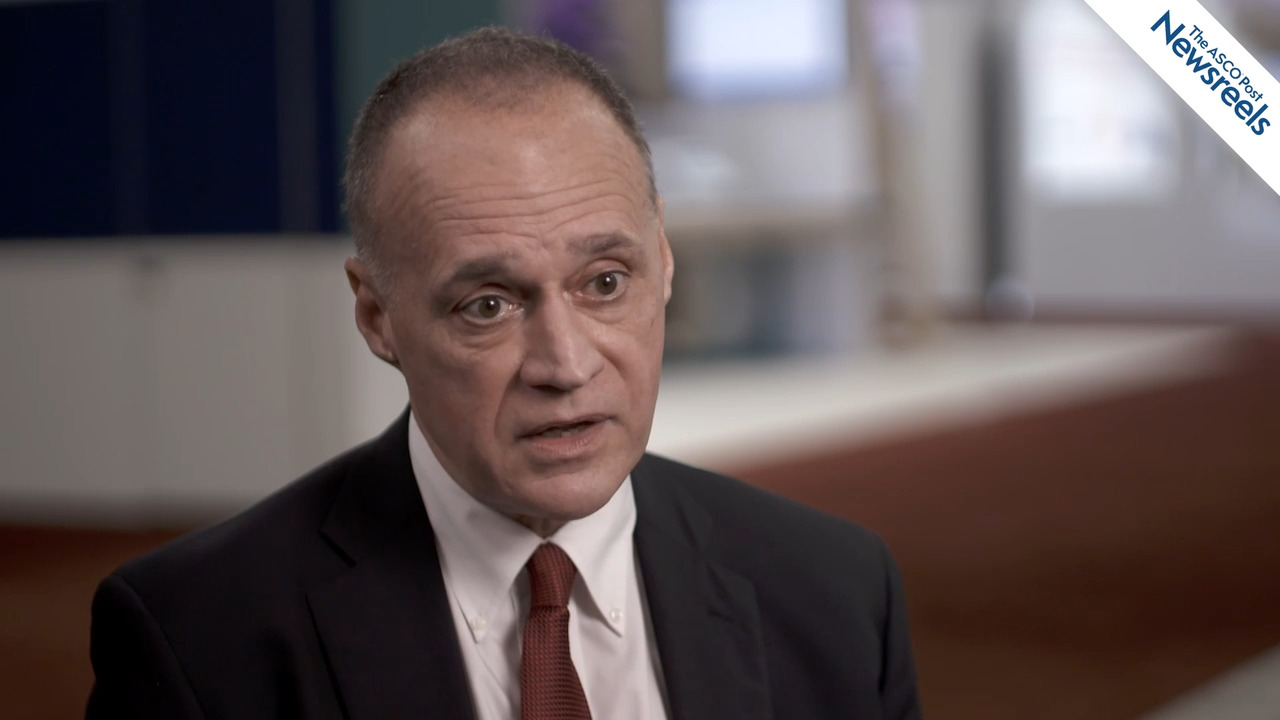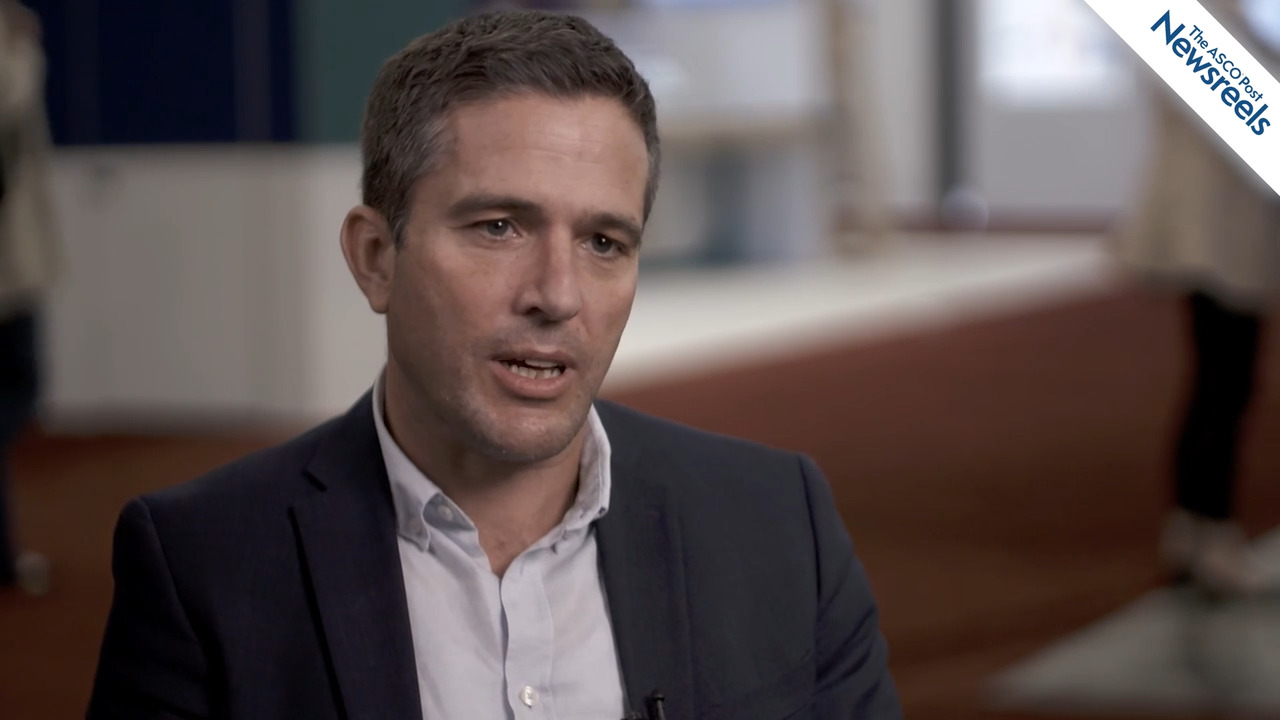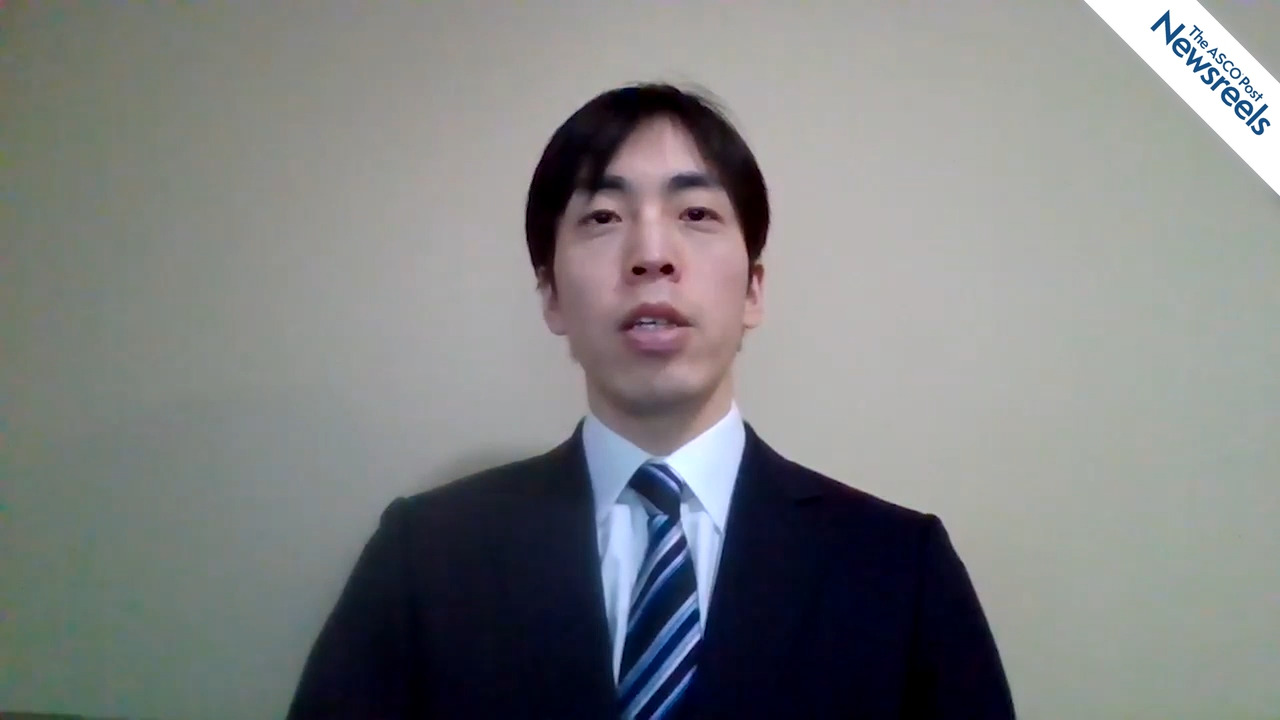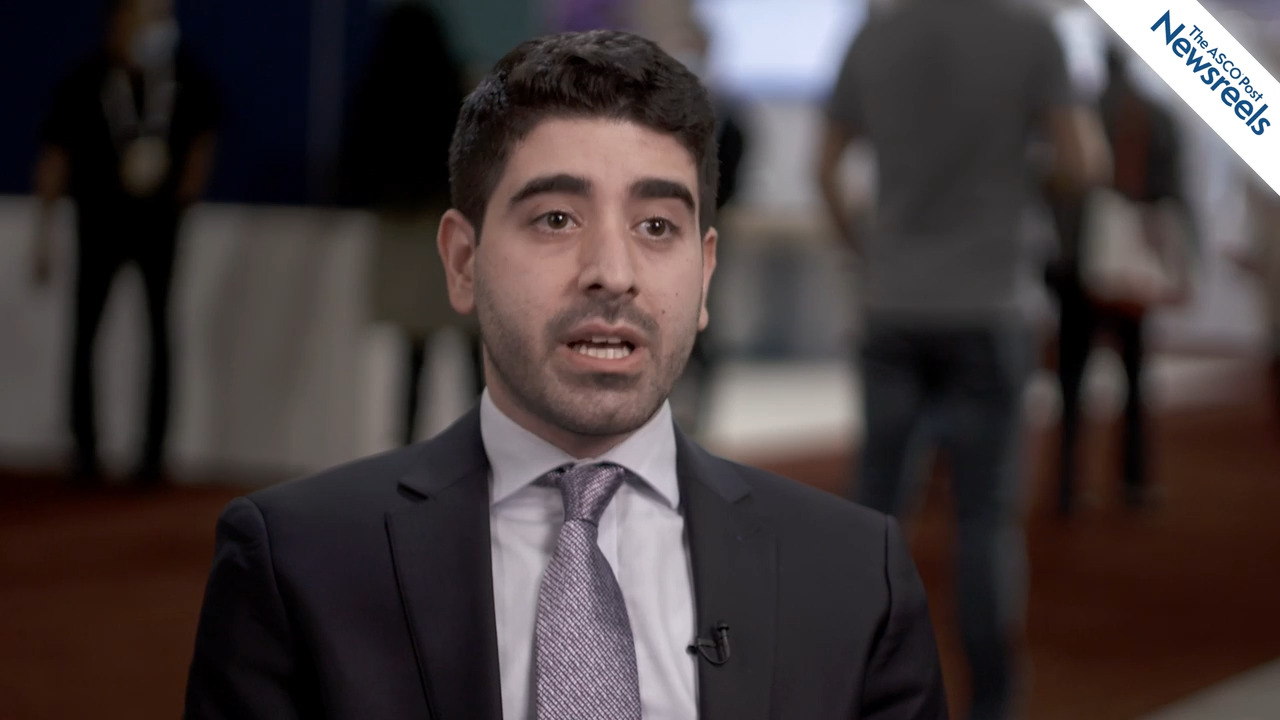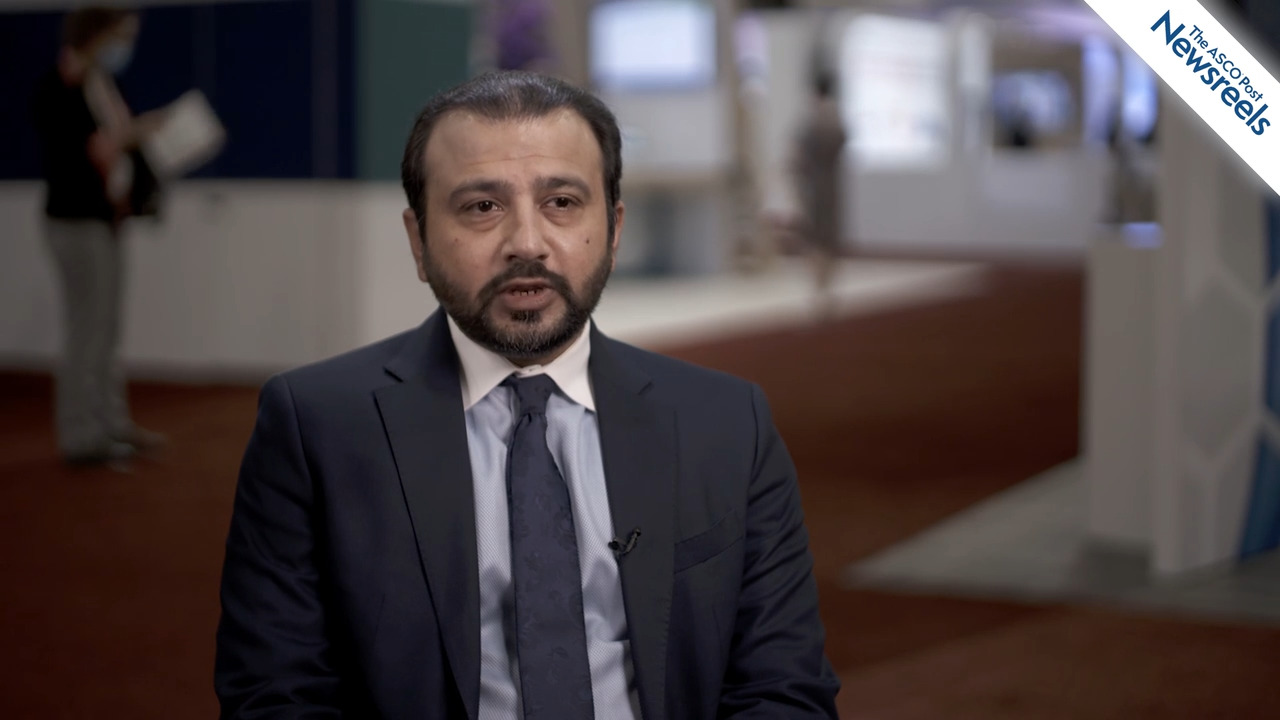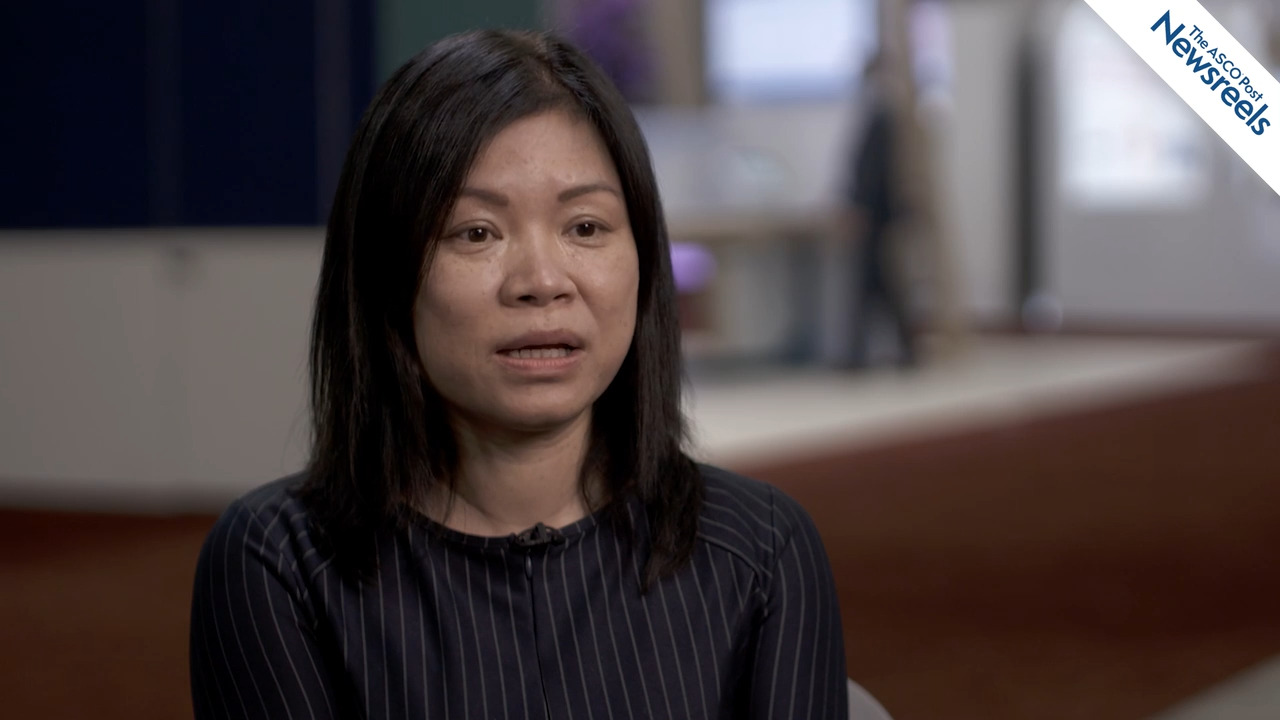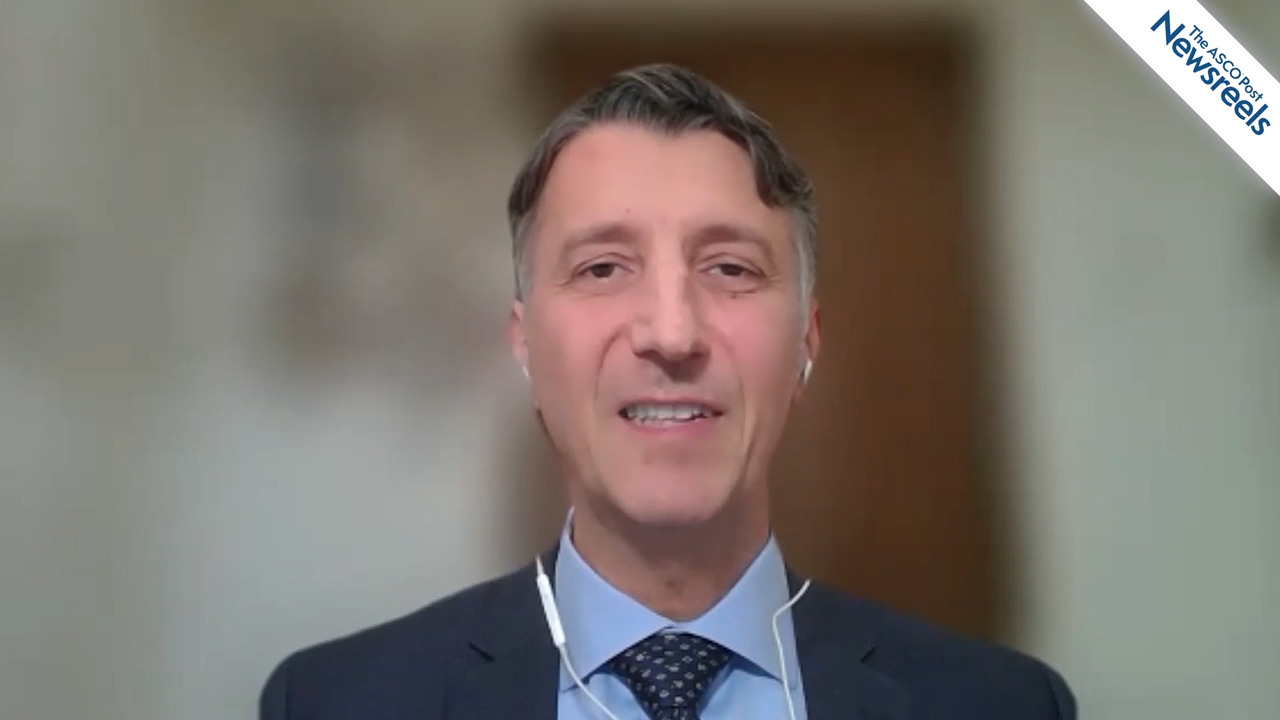2021 ASH Annual Meeting & Exposition
Isatuximab-Containing Induction Therapy for Multiple Myeloma Increases Measurable Residual Disease Negativity
For the first-line treatment of newly diagnosed multiple myeloma, the percentage of patients achieving measurable residual disease (MRD, previously called minimal residual disease) negativity was sign...
Mosunetuzumab Meets Primary Endpoint of Phase II Trial in Relapsed or Refractory Follicular Lymphoma
The bispecific antibody mosunetuzumab achieved deep and durable remissions as monotherapy in patients with relapsed or refractory follicular lymphoma, according to the results of a pivotal phase II tr...
POLARIX: Addition of Polatuzumab Vedotin-piiq to Standard of Care Significantly Reduces Progression of Diffuse Large B-Cell Lymphoma
As a first-line treatment of inter-mediate- or high-risk diffuse large B-cell lymphoma, the addition of the antibody-drug conjugate polatuzumab vedotin-piiq to standard-of-care therapy resulted in a 2...
Lisocabtagene Maraleucel Improves Outcomes in Relapsed or Refractory Large B-Cell Lymphoma
Chimeric antigen receptor (CAR) T-cell therapy with lisocabtagene maraleucel could prove to be the new standard-of-care treatment for patients with relapsed or refractory large B-cell lymphoma in the ...
ZUMA-7: Axicabtagene Ciloleucel Quadruples Event-Free Survival in Large B-Cell Lymphoma
In the primary analysis of the phase III ZUMA-7 trial, examining second-line therapy for relapsed or refractory large B-cell lymphoma, the CAR T-cell therapy axicabtagene ciloleucel led to a fourfold ...
Philip L. McCarthy, MD, Comments on Trials Evaluating the Early Detection of Myeloma
The ASCO Post invited myeloma expert Philip L. McCarthy, MD, Director of the Transplant and Cellular Therapy Program at Roswell Park Comprehensive Cancer Center, Buffalo, New York, to comment on the t...
Studies Evaluate Screening for Early Multiple Myeloma
Precursors to multiple myeloma were identified by population screening in two studies reported at the 2021 American Society of Hematology (ASH) Annual Meeting & Exposition. The prevalence of monoc...
PANTHER: No Significant Benefit for Pevonedistat Plus Azacitidine in Higher-Risk Myelodysplastic Syndrome
The phase III PANTHER trial, which evaluated pevonedistat plus azacitidine vs azacitidine alone in higher-risk myelodysplastic syndromes, chronic myelomonocytic leukemia, and low–blast count acute mye...
Tycel Phillips, MD, on Marginal Zone Lymphoma: Efficacy and Safety of Parsaclisib
Tycel Phillips, MD, of the Rogel Cancer Center, University of Michigan, discusses phase II findings from the CITADEL-204 study of parsaclisib, a next-generation inhibitor of phosphatidylinositol 3-kin...
AGILE Study: Addition of Ivosidenib to Azacitidine Triples Median Overall Survival in Difficult-to-Treat AML Population
In patients with newly diagnosed acute myeloid leukemia (AML) with an IDH1 mutation who were ineligible for intensive chemotherapy, the addition of the IDH1 inhibitor ivosidenib to azacitidine signifi...
Romanos Sklavenitis-Pistofidis, MD, on Smoldering Myeloma: Identifying Biomarkers of Response to Immunotherapy
Romanos Sklavenitis-Pistofidis, MD, of Dana-Farber Cancer Institute, discusses study findings on a next generation of clinical assays to assess both tumor biology and immune state, as well as common c...
Anil Aktas-Samur, PhD, on Identifying Low-Risk Smoldering Multiple Myeloma
Anil Aktas-Samur, PhD, of Dana-Farber Cancer Institute, discusses study findings on the genomic characterization of non-progressor smoldering multiple myeloma, results that may provide a molecular def...
Musa Yilmaz, MD, on FLT3-ITD–Mutated AML: Findings on Quizartinib With Decitabine and Venetoclax
Musa Yilmaz, MD, of The University of Texas MD Anderson Cancer Center, discusses study results suggesting that quizartinib with decitabine and venetoclax is active in patients with FLT3-ITD–mutated ac...
Manali Kamdar, MD, on Large B-Cell Lymphoma: Lisocabtagene Maraleucel vs the Standard of Care
Manali Kamdar, MD, of the University of Colorado Cancer Center, discusses phase III results from the TRANSFORM study, which suggest that lisocabtagene maraleucel, a CD19-directed CAR T-cell therapy, i...
Joe Schroers-Martin, MD, on Follicular Lymphoma: Precursor Mutations May Be Detectable Years Before Diagnosis
Joe Schroers-Martin, MD, of Stanford University, discusses his latest study findings, which show that follicular lymphoma driver mutations are detectable in blood and saliva years prior to a clinical ...
Nikhil C. Munshi, MD, PhD, on COVID-19 Vaccine Effectiveness in Patients With Multiple Myeloma
Nikhil C. Munshi, MD, PhD, of Dana-Farber Cancer Institute, discusses the findings from a large nationwide Veterans Affairs study, which showed that, for patients with multiple myeloma, the effectiven...
Sangeetha Venugopal, MD, on Secondary AML: Impact of Front-Line Treatment Approach
Sangeetha Venugopal, MD, of The University of Texas MD Anderson Cancer Center, discusses a retrospective analysis of 562 patients with treated secondary acute myeloid leukemia and prior exposure to hy...
Andrew Matthews, MD, on AML: CPX-351 vs Venetoclax/Azacitidine for Initial Therapy
Andrew Matthews, MD, of the Abramson Cancer Center, University of Pennsylvania, discusses findings from a retrospective study at an academic institution, which showed there was no statistically signif...
Molecular Analysis Advances Risk Profiling and Assessment of Immunotherapy Response in Smoldering Myeloma
Molecular and genetic research has advanced the categorization of different risk groups in patients with smoldering myeloma. Notable presentations at the 2021 American Society of Hematology (ASH) Annu...
Expert Point of View: Krish Patel, MD
Krish Patel, MD, Director of the Lymphoma Program at the Swedish Cancer Institute in Seattle and Interim Director of the Hematological Malignancies and Cellular Therapy Program, commented on the impli...
Measurable Residual Disease Kinetics: A Potential New Tool in CLL
Achieving undetectable measurable residual disease (MRD) is an important milestone in the treatment of patients with chronic lymphocytic leukemia (CLL) as well as those with other hematologic malignan...
Alba Rodriguez-Meira, DPhil, on TP53-Mutated Leukemic Transformation in Myeloproliferative Neoplasms
Alba Rodriguez-Meira, DPhil, of the University of Oxford, discusses a comprehensive analysis of the genetic, cellular, and molecular landscape of TP53-mediated transformation, providing insights into ...
Leslie S. Kean, MD, PhD, on Bone Marrow Transplantation: Using Abatacept to Prevent Graft-vs-Host Disease
Leslie S. Kean, MD, PhD, of Dana-Farber/Boston Children's Cancer and Blood Disorders Center, discusses findings from her analysis of the International Blood and Marrow Transplant Research Database, wh...
Eunice S. Wang, MD, on FLT3-Mutated AML: Gilteritinib and Azacitidine for Intensive Induction Chemotherapy–Ineligible Patients
Eunice S. Wang, MD, of Roswell Park Comprehensive Cancer Center, discusses phase III results showing that gilteritinib and azacitidine led to significantly higher composite complete response rates in ...
Roni Shouval, MD, PhD, on TP53-Mutant Large B-Cell Lymphoma and CAR T-Cell Therapy
Roni Shouval, MD, PhD, of Memorial Sloan Kettering Cancer Center, discusses his findings, which show, for the first time, that TP53 alterations are a valuable prognostic and potentially predictive mar...
Michael R. Bishop, MD, on Aggressive B-Cell NHL: Tisagenlecleucel vs Standard of Care as Second-Line Therapy
Michael R. Bishop, MD, of the University of Chicago, discusses insights from findings of the phase III BELINDA study, which may inform the design of future CAR T-cell trials, as well as the use of sec...
Carsten Utoft Niemann, MD, PhD, on CLL: Time-Limited Venetoclax and Ibrutinib for Patients With Relapsed or Refractory Disease
Carsten Utoft Niemann, MD, PhD, of Copenhagen University Hospital, discusses a primary analysis of the phase II Vision HO141 trial, which showed the feasibility of stopping and restarting ibrutinib an...
Masayuki Umeda, MD, on Pediatric AML: Identifying a Key Subtype-Defining Lesion
Masayuki Umeda, MD, of St. Jude Children's Research Hospital, discusses his research which showed that UBTF-TD (upstream binding transcription factor-tandem duplications) define a unique subtype of ac...
Study Examines a Potential Approach to Mitigate CAR T-Cell Therapy Toxicity
Research demonstrating a novel approach that may reduce cytokine-release syndrome associated with chimeric antigen receptor (CAR) T-cell therapy was presented by Marcela Maus, MD, PhD, and colleagues ...
Ibrutinib Plus Fludarabine, Cyclophosphamide, and Rituximab for Younger Patients With CLL
A study presented by Matthew S. Davids, MD, of Dana-Farber Cancer Institute, and colleagues at the 2021 American Society of Hematology (ASH) Annual Meeting & Exposition (Abstract 640) suggests tha...
Tarek H. Mouhieddine, MD, on Relapsed/Refractory Multiple Myeloma and Bispecific Antibodies
Tarek H. Mouhieddine, MD, of The Mount Sinai Hospital and The Icahn School of Medicine at Mount Sinai, discusses data that suggest patients with heavily pretreated, predominantly triple-class refracto...
Talha Badar, MD, on TP53-Mutated AML and the Impact of Allogeneic Stem Cell Transplantation on Survival
Talha Badar, MD, of the Mayo Clinic, discusses the near-universal poor outcomes for patients with TP53-mutated acute myeloid leukemia and the findings that show allogeneic stem cell transplantation ap...
POLARIX: Pola-R-CHP vs R-CHOP for Previously Untreated Patients With DLBCL
The POLARIX study found patients with diffuse large B-cell lymphoma (DLBCL) had a significantly higher likelihood of survival without disease progression 2 years after receiving a new drug combination...
BELINDA Study: Second-Line Tisagenlecleucel Equivalent to Standard of Care for Relapsed or Refractory Aggressive B-Cell Non-Hodgkin Lymphoma
In an analysis of the phase III BELINDA trial presented by Bishop et al during the 2021 American Society of Hematology (ASH) Annual Meeting & Exposition (Abstract LBA-6), the chimeric antigen rece...
ZUMA-7 Primary Analysis: Second-Line Axicabtagene Ciloleucel Quadruples Event-Free Survival in Large B-Cell Lymphoma
In the primary analysis of the phase III ZUMA-7 trial, the chimeric antigen receptor (CAR) T-cell therapy axicabtagene ciloleucel led to a fourfold increase in event-free survival over the standard o...
Study Identifies Factors for Severe COVID-19 Illness Among Patients With Acute Leukemia or MDS
In separate analyses of 257 patients with acute leukemia or myelodysplastic syndrome (MDS) who developed COVID-19 and are part of the American Society of Hematology (ASH) RC COVID-19 Registry for Hema...
Daniel A. Ermann, MD, on DLBCL: Outcomes With Consolidative Radiation Therapy
Daniel A. Ermann, MD, of the Huntsman Cancer Institute, University of Utah, discusses results from the largest retrospective study on outcomes utilizing radiotherapy in early-stage diffuse large B-cel...
L. Elizabeth Budde, MD, PhD, on Relapsed/Refractory Follicular Lymphoma: Early Results on Mosunetuzumab Monotherapy
L. Elizabeth Budde, MD, PhD, of City of Hope, discusses phase I/II findings that showed mosunetuzumab monotherapy induces deep and durable remissions in patients with relapsed or refractory follicular...
Isatuximab/RVd Meets Primary Endpoint of MRD Negativity for Newly Diagnosed, Transplant-Eligible Patients With Multiple Myeloma
For the first-line treatment of newly diagnosed, transplant-eligible patients with multiple myeloma, the achievement of measurable residual disease (MRD) negativity was significantly greater when the ...
Study Reveals Gaps in Code Status Discussions Among Patients With High-Risk AML
Oncologists and health-care professionals who treat patients with high-risk acute myeloid leukemia (AML) are missing important opportunities to have end-of-life discussions at earlier stages in the di...
Antibody Response to COVID-19 Vaccination in Patients With Myeloid and Lymphoid Neoplasms
According to a German study by Rotterdam et al presented at the 2021 American Society of Hematology (ASH) Annual Meeting & Exposition (Abstract 218), about 15% of people with blood cancers and oth...
ASH RC COVID-19 Registry for Hematology: Risk Factors for Hospitalization and Death Among Patients With Hematologic Malignancies Infected With COVID-19
Patients with blood cancers, particularly those with more advanced disease, are at increased risk for serious COVID-19 outcomes, including an elevated chance of severe illness or death from infection,...
Ivosidenib/Azacitidine vs Azacitidine Alone in Patients With Newly Diagnosed IDH1-Mutated AML
In the phase III AGILE trial, the combination of ivosidenib and azacitidine was found to be superior in treating newly diagnosed patients with IDH1-mutated acute myeloid leukemia (AML) compared to aza...
Antibody Response to Second Dose of mRNA COVID-19 Vaccine in Patients With AML and MDS
In one of the largest studies to date of the antibody response to vaccination against COVID-19 in people who had been treated for acute myeloid leukemia (AML) and myelodysplastic syndrome (MDS), patie...
Paolo Ghia, MD, PhD, on CLL: New Data on Treatment With Ibrutinib Plus Venetoclax
Paolo Ghia, MD, PhD, of the Università Vita-Salute San Raffaele and IRCCS Ospedale San Raffaele, discusses disease-free survival results from the measurable residual disease cohort of the phase II CAP...
TRANSFORM Trial: Lisocabtagene Maraleucel vs Standard of Care for Relapsed or Refractory Large B-Cell Lymphoma
An interim analysis of the TRANSFORM trial comparing the chimeric antigen receptor (CAR) T-cell immunotherapy lisocabtagene maraleucel to standard of care found that the CAR T-cell therapy significant...
Activity of Mosunetuzumab in Pretreated Patients With Relapsed or Refractory Follicular Lymphoma
The bispecific antibody mosunetuzumab achieved deep and durable remissions as monotherapy in patients with relapsed or refractory follicular lymphoma who had received two or more prior lines of therap...
Study Reveals Underrepresentation of AYA Hispanic Patients in a Large ALL Clinical Trial
A study of U.S. adolescent and young adult patients with acute lymphoblastic leukemia (ALL) found that Hispanic patients were significantly underrepresented in a large clinical trial compared with the...
Outcomes Among Pediatric and Young Adult Patients With ALL Differ By Race, Ethnicity, and Socioeconomic Status
A study of nearly 25,000 patients with acute lymphoblastic leukemia (ALL) aged up to 30 years old revealed significant gaps in survival rates between White, Hispanic, and Black patients, as well as wo...


